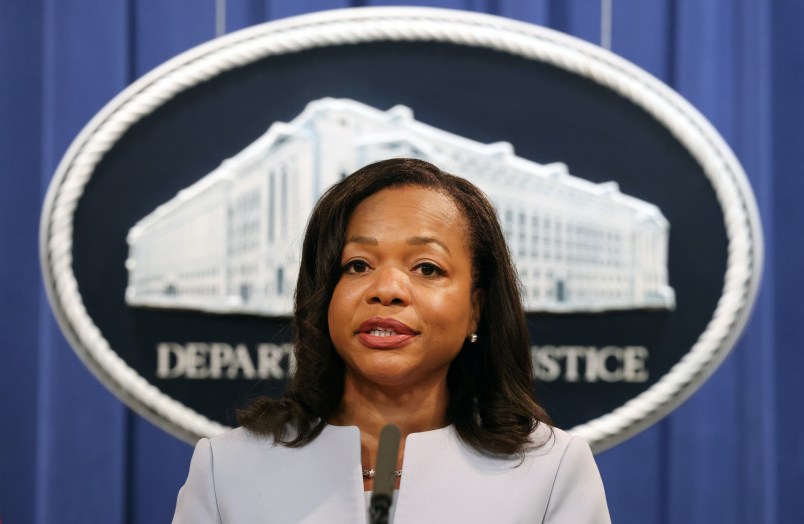U.S. Assistant Attorney General Kristen Clarke testified before a House subcommittee Monday, submitting a 20-page document to underscore the dire threat faced by democracy without a robust Voting Rights Act.
The conservative majority on the Supreme Court took a hatchet to the VRA first in 2013 and again this year. In Shelby County v. Holder, the majority threw out the formula for determining whether a state or locality had a history of discriminatory voting practices and had to get permission — “preclearance” — from the federal government before changing its practices. The conservatives used as rationale the strides the United States has supposedly made towards racial equality, a move the late Justice Ruth Bader Ginsberg equated to throwing out your umbrella in a rainstorm because you’re no longer getting wet.
The conservative majority followed it up with a decision this year that further weakens the law’s reach.
Clarke sought to hammer the importance of the law by revealing the monsoon that umbrella held at bay.
“Although the Attorney General objected to only about one percent of voting changes submitted under Section 5, this meant that more than 3,000 discriminatory voting changes were blocked between 1965 and June 25, 2013, the date of the Shelby County decision,” she wrote in her prepared remarks.
She picked out from that number some of the most egregious attempted changes.
“One such objection stopped a 2007 Texas statute, which would have imposed a landownership requirement to be able to run for some elected offices,” she wrote.
The thesis of her remarks was clear: imploring Congress to pass legislation and patch the holes gouged into the law by a court hostile to voting rights.
The House is expected to take up a bill that would do just that later this month: the John Lewis Voting Rights Advancement Act. Senate Democrats are working on a new voting rights package behind the scenes, preparing for a mid-September push after recess.
But before any voting rights legislation can pass the Senate, it must get around the filibuster, and the 60-vote threshold it imposes for most legislation. Only one Republican, Sen. Lisa Murkowski (R-AK), supports the John Lewis Voting Rights Act, at least in its original form. There are not 10 Republican votes for voting rights bills, meaning they will be blocked by the filibuster in its current form.
The urgency of the need for voting rights protections has become clearer since last week, when 2020 Census data dropped and the clock on redistricting started.
“Without congressional action, the upcoming redistricting cycle will be the first without the full protections of the Voting Rights Act,” Clarke wrote. “Without preclearance, the Department will not have access to maps and other redistricting-related information from many jurisdictions where there is reason for concern, even though this kind of information is necessary to assess where voting rights are being restricted or inform how the Department directs its limited enforcement resources.”
She also highlighted the newfound difficulty of challenging discriminatory maps and voting practices without the Section 5 review process the Supreme Court effectively killed in Shelby. It’s a difference between months and years of litigation, she wrote, a price differential “on an order of magnitude similar to the cost of a Ford Fiesta compared to a Boeing 737.”
A lengthier court battle also heightens the risk that the discriminatory laws remain in place for election cycles, a reality that incentivizes states to try to pass the most aggressive redistricting maps possible, experts told TPM.
“On behalf of the Attorney General, we ask Congress to pass appropriate legislation that will restore and improve the Voting Rights Act, enhancing the Department’s ability to protect the right to vote in the twenty-first century and beyond,” Clarke finished.
Read her remarks here:



